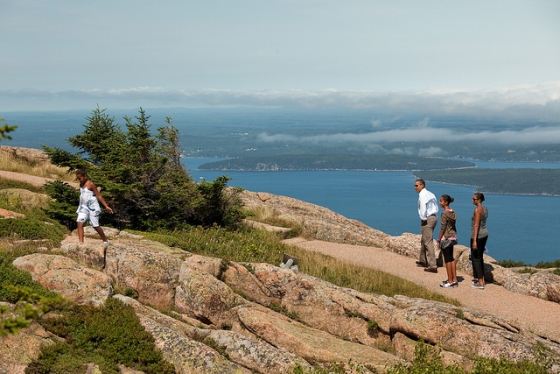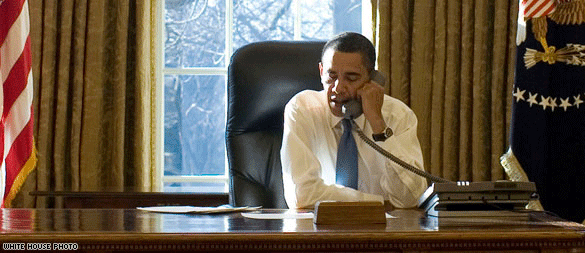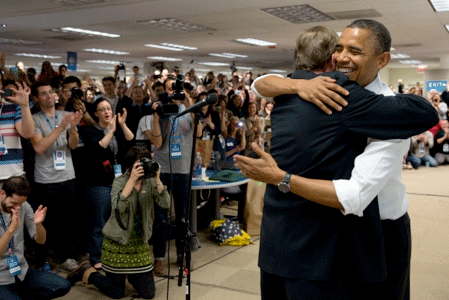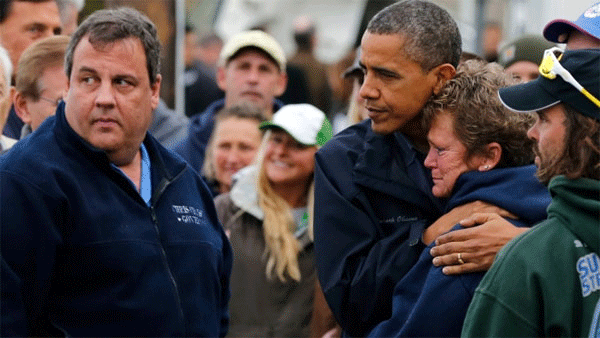The Environment and President Obama’s Second Term
Air Date: Week of November 9, 2012

President Barack Obama and his family hike on Cadillac Mountain at Acadia National Park in Maine, July 16, 2010. (Official White House Photo by Pete Souza)
Americans have voted to give President Obama a second term. Now he has four more years to make progress on environmental issues, such as climate change. Host Steve Curwood discusses the possible environmental priorities with ConservAmerica’s Vice President for Government and Political Affairs, Dave Jenkins, and the Natural Resources Defense Council’s Director of the Climate and Clean Air Program, Dan Lashof.
Transcript
CURWOOD: From the Jennifer and Ted Stanley Studios in Boston, this is Living on Earth. I'm Steve Curwood. On November sixth, after a marathon of rancorous campaigning, Americans voted to give President Obama four more years to deliver on the hopes that swept him to power in 2008.

President Barack Obama in the Oval Office, Sept. 28, 2012. (Official White House Photo by Pete Souza)
OBAMA: But despite all our differences, most of us share certain hopes for America’s future. We want our kids to grow up in a country where they have access to the best schools and the best teachers — (cheers, applause) — a country that lives up to its legacy as the global leader in technology and discovery and innovation — (scattered cheers, applause) — with all of the good jobs and new businesses that follow. We want our children to live in an America that isn’t burdened by debt, that isn’t weakened by inequality, that isn’t threatened by the destructive power of a warming planet. (Cheers, applause)].
CURWOOD: That warming planet is one of the most profound challenges that faces the president in his second term. We have two informed observers to discuss what the elections might mean for that and other environmental issues – ConservAmerica’s Vice President for Global and Political Affairs, Dave Jenkins. Hello Dave!
JENKINS: Hi, how are you doing?

Dave Jenkins, Vice President of Government and Political Affairs at ConservAmerica (formerly Republicans for Environmental Protection)
CURWOOD: And, on Skype, also from Washington, is the Natural Resources Defense Council’s Director of Climate and Clean Air program, Dan Lashof. Hi there, Dan!
LASHOF: Hey Steve.

Dan Lashof, Director of NRDC’s Climate and Clean Air program
CURWOOD: Dave Jenkins, millions of dollars from corporate sources, particularly the fossil fuel interests, were spent over this past election cycle, but at the end of the day, pretty much the status quo. What is the lesson here, do you think?
JENKINS: I think the lesson here is that all that money poured into the Republican side, and yet the message that they were putting forth on television didn’t reflect the kind of forward-thinking, taking care of future generations, being responsible – these values that most people define as Conservative.
They were more of an all-in, you know, live for the day… drill, baby, drill! Talking about a war on coal when you know, people know that the reason that coal is being displaced is because of natural gas and the marketplace… far more so than regulation. You look at the constituencies, you want to appeal to young people, you want to appeal to minorities, you want to build a winning coalition the way Reagan did back in the 80s.

President Barack Obama hugs his campaign manager, Jim Messina, during an unannounced stop at his campaign headquarters in Chicago, Ill., Nov. 7, 2012. (Official White House Photo by Pete Souza)
And the polarizing rhetoric, and everything that really was sort of enhanced simply with all that industrial and corporate money – no matter how much you broadcast it on TV, if it’s not a message that resonates with the American public, you’re not going to get through. My hope is that our party will be skeptical of the agenda and the items that special interests put forward, and try to take a step back and think about it in the context of the best interest for the nation as a whole.
CURWOOD: Dan Lashof, what’s the lesson here – all that money for the election and we’re really still at the status quo.
LASHOF: Well, I think we’re even better off than the status quo in terms of the make-up of the Senate. And when all is said and done, I think it will turn out that the fossil fuel industry spent 500 million dollars trying to defeat people who had the temerity to suggest that we need to invest in renewable energy and deal with climate change, and they lost… in every case.
So, we have coming to the Senate, some real champions such as Martin Heinrich in New Mexico and Tammy Baldwin in Wisconsin, Tim Kaine… the coal industry spent millions of dollars trying to defeat him in Virginia and they failed, Angus King, a strong independent from Maine who will… is a champion of dealing with climate change. So, ultimately, the lesson is that money can’t buy you love if what you’re trying to sell is a fossil fuel future that is bad for the country.
CURWOOD: Let’s just take a look for a moment at the ballot initiatives… you know when people feel like they have to go around their legislatures when they’re really frustrated when they go to the legislatures, when legislators are blocking things they think, “oh, the ballot initiative.” We saw that on initiatives like gay marriage and marijuana… most of these initiatives won, but most of the environmental measures went nowhere. What happened with the labeling of genetically modified organisms in California, or Michigan’s renewable fuel standard?
LASHOF: Well, on the Michigan standard, the argument that the opposition put in on Michigan wasn’t about the substance, it was an argument that this shouldn’t be done through a Constitutional amendment, and I think that they’re there so… so the answer there is that that mechanism was the wrong mechanism for moving renewable energy forward. The public strongly supports moving renewable energy forward, and so that’s a bit of an anomaly.
And, in California, I think that may be one of the few examples where money really did influence the outcome – Big Ag really did put millions of dollars into defeating that proposition. And propositions are hard to win – there’s kind of a strong bias overall for people to vote ‘no’ and when you have a lop-sided investment of money, it’s very hard to prevail.
CURWOOD: Dave Jenkins?
JENKINS: Yeah, I agree with what Dan said, but I would also add though, that if you look a little deeper and you look at ballot initiatives for open space and parks, and those are overwhelmingly supported by people of every political stripe, and I think that goes to a better quality of life desired by folks and that everybody agrees that we need to be responsible when it comes to land stewardship. So, there’s no real negative wave or anything like that with respect to environmental ballot initiatives, I don’t think that any of these things really lost on their merit.
CURWOOD: I want to ask you both about the prospects now for the Keystone XL pipeline. Dave Jenkins, do you think that this is a good thing for the President to block, and do you think that he has the political capital to do so if he wants to?
JENKINS: When you’ve got a little bit more conventional-type oil reserves up in North Dakota and places like that, for me it doesn’t make a ton of sense to bring that carbon-intensive fuel here and have a pipeline here going all the way to the Gulf of Mexico where there’s decent odds that that product wouldn’t even be sold to Americans, that that product would just be shipped over to China.
So, I’d hope that the State Department and the President, you know, look at it carefully and consider all the impacts and make an informed decision. But I don’t think Congress would be quite as in a position to block his action as it was before. One, he’s not standing for re-election again and two, he’s got two more extra Democrat votes in the Senate.
CURWOOD: Dan Lashof?
LASHOF: So, on the Keystone XL pipeline, the administration needs to complete the environmental review process that they’ve started. We think that it’s very clear that the conclusion of that should be to reject the pipeline as not in our national interest. It is a pipeline that would bring one of the dirtiest sources of fossil fuels and the President should stick with his focus of improving efficiency, supporting renewables, and moving the country towards a clean energy economy as he has talked about.
CURWOOD: How much do you think this huge federal deficit is going to affect science and research funding going forward now? Dan Lashof?
LASHOF: Well, I think the deficit is a big problem and how the ‘fiscal cliff’ is addressed is going to impact both science research and energy research and investments in environmental protection and infrastructure as well as I think, you know, in the aftermath of Sandy, the clear need is to invest in preparing for the effects of climate change that we can no longer address.
So, we certainly think that that needs to be solved in a way that has a balance between raising revenue, and that spending cuts have to be carefully targeted and should be things like cutting fossil fuel subsidies. So, whether that’s solved in a bipartisan way I think will set the tone for how policy is addressed throughout the second term.
CURWOOD: Dave Jenkins, funding for science and research?
JENKINS: The funding, it needs to be reduced in a balanced way across the different areas. And what we saw in the last Congress was an effort by some to target things like the Endangered Species Act and target clean energy and Land and Water Conservation Funding, and things like that. And disproportionately, as apart of a sort of ideological sort of Libertarian-type agenda, and that’s not in the nation’s best interest.
If you’ve got to tighten your belt and you’ve got to take serious cuts - what you want to do is do it in a balanced way, you can’t starve this important area of what our country needs to go forward.
CURWOOD: Superstorm Sandy reminds us that climate disruption is on a track to wreck our civilization. The President, when our election was over, talked about wanting to leave a safe planet for the next generations, but the present path of the White House would not do that, many scientists say. Do you think Obama is going to be able to reach out and find the sort of intestinal fortitude that allowed him to plow ahead with the healthcare measures in the face of the incredibly stiff opposition to dealing with climate change? Dave Jenkins?
JENKINS: Yeah, I mean one of the things that we really fault President Obama for is that when there was an opportunity for climate legislation on Capitol Hill, he seemed to want to stand back and let the folks in Congress lead the way, and didn’t really provide a lot of leadership on that.
Now, the only way he moves forward and really doubles down and tries to do something big, is if he brings Republicans along in the effort. And if the President’s not out there using the bully pulpit to rally support, odds are politicians are not going to have the courage to stand out and address the issue.
CURWOOD: Dan Lashof?
LASHOF: Well, I think the President certainly recognizes that action on climate change is one of the big unfinished items on his agenda from the first term and that he’ll try to move it forward. And I agree with Dave that he needs to lead on this issue.
I don’t expect that he’s going to get a lot of bipartisan consensus in the Congress. I think that he can develop a consensus among a majority of – you know Democrats and Republicans – in the public who want to see action. He needs to do more to lead and bring people together around steps that he has the authority to take to reduce carbon polution on the one hand, and to better prepare the country to deal with the consequences of climate change, things like Hurricane Sandy, on the other. And I think he can and I am optimistic that he will.

President Barack Obama hugs Donna Vanzant, the owner of North Point Marina, as he tours damage from Hurricane Sandy in Brigantine, N.J., Oct. 31, 2012. (Official White House Photo by Pete Souza)
JENKINS: Let me add that the President needs to be out front and leading and trying to convince average Americans. And he needs to do that, not sort of like Al Gore does, trying to own the issue himself, he needs to have partners - bipartisan partners that also advance that cause so that the message reaches Americans of all political stripes. And we’ve got to all move together forward on this if we’re going to expect folks in Congress to wake up and decide to do something.
CURWOOD: Dave Jenkins is Vice President for government and political affairs for ConservAmerica, thank you so much, Dave!
JENKINS: Thank you!
CURWOOD: And Dan Lashof is Director of the Climate and Clean Air program of the Natural Resources Defense Council – thanks so much, Dan.
LASHOF: Thanks, Steve!
Links
Dave Jenkins’s profile on ConservAmerica’s site
Dan Lashof’s profile on the Natural Resources Defense Council’s website
Living on Earth wants to hear from you!
Living on Earth
62 Calef Highway, Suite 212
Lee, NH 03861
Telephone: 617-287-4121
E-mail: comments@loe.org
Newsletter [Click here]
Donate to Living on Earth!
Living on Earth is an independent media program and relies entirely on contributions from listeners and institutions supporting public service. Please donate now to preserve an independent environmental voice.
NewsletterLiving on Earth offers a weekly delivery of the show's rundown to your mailbox. Sign up for our newsletter today!
 Sailors For The Sea: Be the change you want to sea.
Sailors For The Sea: Be the change you want to sea.
 The Grantham Foundation for the Protection of the Environment: Committed to protecting and improving the health of the global environment.
The Grantham Foundation for the Protection of the Environment: Committed to protecting and improving the health of the global environment.
 Contribute to Living on Earth and receive, as our gift to you, an archival print of one of Mark Seth Lender's extraordinary wildlife photographs. Follow the link to see Mark's current collection of photographs.
Contribute to Living on Earth and receive, as our gift to you, an archival print of one of Mark Seth Lender's extraordinary wildlife photographs. Follow the link to see Mark's current collection of photographs.
 Buy a signed copy of Mark Seth Lender's book Smeagull the Seagull & support Living on Earth
Buy a signed copy of Mark Seth Lender's book Smeagull the Seagull & support Living on Earth

